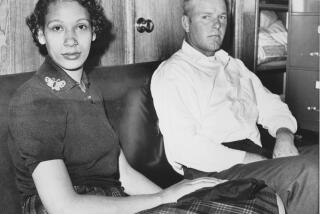Feminist Looks at How Women Can Embrace Authentic Love
COMMUNION
The Female Search for Love
By bell hooks
William Morrow
256 Pages, $24.95
A philosopher, intellectual and writer, bell hooks has never been afraid to tackle difficult subjects, whether they be the differences in feminist thought and practice between white women and women of color, the convergence of race, class and gender in the movies or her difficult childhood. Across a publishing career that spans almost 15 years and 20 books, hooks has consistently challenged conventional ways of thinking and being while attempting to illuminate the everyday lives of a legion of women.
Although usually touching on love in her books and essays, hooks did not write her first book-length exploration of the topic until 2000’s “All About Love.” Part self-exploration, part critical analysis of popular self-help books, “All About Love” was a general discussion of love in American life and culture, from familial love to romantic attachments. It laid the groundwork for a second volume, last year’s “Salvation,” which critiqued the ways in which African Americans are victims and perpetrators of rigid, patriarchal modes of love that repress their humanity and capacity for emotional connection. The third book in what has become a trilogy, “Communion” extends the themes of the first two by considering the challenges and rewards of loving in midlife.
Though discussions of love by feminists might strike some readers as an oxymoron, hooks is the perfect person to synthesize a generation’s worth of scholarship, self-help books and women’s personal experiences on the subject of self-development, intimate relationships and love. For hooks, the beginning of understanding the tremendous opportunity women have to love is to acknowledge the debt women owe to the feminist or women’s liberation movement. “By challenging sexist ways of thinking about the body,” hooks asserts, “feminism offered new standards of beauty, telling us plump bodies were luscious and big bellies sublime.... It created new possibilities of self-actualization in both our work lives and our intimate lives.” And though many can remember the gains achieved during the feminist movement regarding equal pay for equal work or a woman’s right to control her body, few recall the battle for equality in loving relationships.
Luckily for the reader, hooks does and recounts, through personal experiences in consciousness-raising sessions and the bedroom, her intellectual and sexual awakening during the women’s movement that seems almost like an Everywoman story for certain groups of college-educated baby boomers. A Southern Baptist girl away from home at Stanford University, hooks was dazzled by the heady atmosphere of questioning and experimentation that went along with the feminist movement of the 1970s, especially when it came to love. “Radical feminism encouraged women to question our obsession with love,” hooks remembers. “In extreme cases, individual women urged us to forget love and get into power.” And though feminism had its greatest triumphs in the workplace, it is on an emotional level that hooks believes feminism failed to show ways that women and men could throw off male-dominated modes of thinking and relating to each other to embrace fuller, more authentic relationships. “Communion,” then, is hooks’ quest to get at the root causes for the lack of intimate, loving relationships between women and their partners and find ways in which women can break the cycle of thinking that has retarded their emotional growth. In addition to chapters that emphasize coming to terms with and loving oneself “right where you are,” hooks does a masterful job in critiquing the envy among women (mothers, daughters and friends) that destroys their self-esteem and capacity for trusting relationships as well as the ways in which some men’s emotional withholding and distancing are barriers to true intimacy.
Equally important and moving are chapters that explore the search by women at midlife for partners to love and the importance of platonic “romantic friendships” that help extend the circle of love beyond an all-consuming, primary connection.
In an era when Americans are reassessing the meaning and value of the great social movements (civil rights, women’s rights, gay rights) and what they have to teach future generations, pioneering feminist hooks’ insights on the appropriate place of love in women’s lives comes as a refreshing tonic in a discourse that has grown stale and bitter between men and women and between the generations. Call it a midlife manifesto or just a thought-provoking read, “Communion” is a thinking woman’s (and man’s) valentine--more nourishing than candy, more enduring than the floweriest language Hallmark has to offer--and a fitting conclusion to hooks’ groundbreaking work on love in American life.
More to Read
Sign up for our Book Club newsletter
Get the latest news, events and more from the Los Angeles Times Book Club, and help us get L.A. reading and talking.
You may occasionally receive promotional content from the Los Angeles Times.






